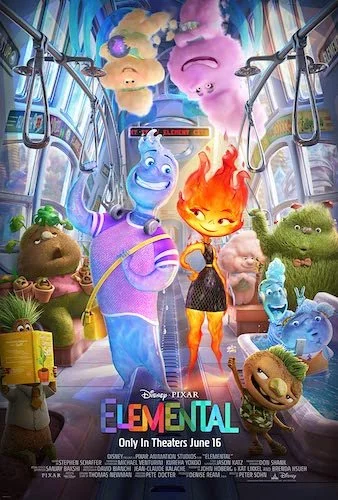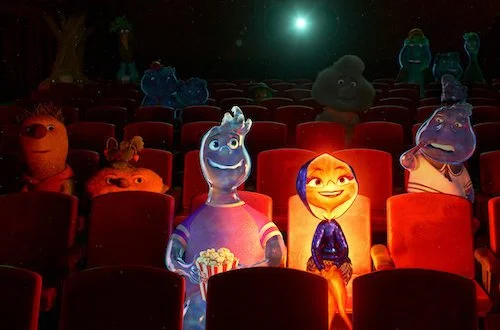Elemental
Written by Andreas Babiolakis
It’s that time of year again: when Pixar releases their latest animated feature. This was an event I used to dearly look forward to, but I feel that notion — that Pixar was relatively untouchable — is all but gone twelve years after Cars 2. Once Disney outright purchased Pixar, Cars 2 didn’t even feel like an anomaly but a prognostication of what was to come: a once-pristine studio that would start to make films to market and not purely for art anymore (sure, the first Cars should have been that sign, but it was easy to forget this film existed once Ratatouille, Wall-E, Up, and Toy Story 3 followed). In the 2010s, Pixar slowed down quite a bit with only perhaps one top-calibre film (Inside Out) and a handful of noteworthy releases (Coco and Soul come to mind) amongst quite a few middle-of-the-road outputs.
Elemental joins that new class of Pixar films that aren’t bad but they certainly aren’t all that they could have been. I caught Pete Docter’s aforementioned Up on television the other day and was reminded of just how breathtaking its symbolism is, particularly the image of Carl Fredricksen pulling his floating house as it loomed over him: an old soul that refuses to let go of life as it once was before death changed it all. I don’t even need to go into the Carl and Ellie love story “short” (but maybe one day I shall), but I did need to be reacquainted with how brilliant Up is through and through. it has an allegorical gimmick that it fine-tunes and perfects with an enriched narrative on top: separate both elements and you’ll get either a terrific fable or an impassioned family film (together these elements render Up a masterwork). If you look at Luca instead, you get a cute film but not something substantial. Whether this is a fairy tale to depict homosexuality (it’s tough not to feel this way when the film is literally about sea beings coming out into the world) or just a straightforward story about friendship, Luca doesn’t explore enough outside of being blissful. It misses its potential so much that it isn’t impressionable outside of being geographical escapism (but it’s still sweet).
Enter Elemental: director Peter Sohn’s first Pixar feature since the forgotten The Good Dinosaur, and it is at least slightly better than Luca yet it faces many similar issues. A fantastic representation of immigration, interracial relationships, and cultural tapestries on paper, Elemental sadly lives up to its name when it comes to its simplistic execution. The film benefits from the many creative ideas especially once the various elements begin to interact with one another, but this is something that we’ve also seen before. Going back to Inside Out, the moods would find that they can coexist in shared core memories: representing the emotional ambiguities of life. In Elemental, a lot of the interactions are cute depictions of science (water evaporating, sod dampening, the like). The film also reminds me a lot of Zootopia in the sense that different species are coexisting with agreed-upon stipulations built on years of bigotry that demand to be broken. Zootopia is more interested in the case being worked on at the forefront as systemic racism is an underlying theme; Elemental reverses these story points by shoving intolerance and backward ideas ahead of any other plot threads. It makes sense for Elemental to do so, but when Zootopia knows how to depict racial harmony and progression better than a film prioritizing these themes, then that isn’t too good (for the record, Elemental does depict these topics beautifully when it comes to the imagery of the film, but it is the story that falls flat in these ways).
Aesthetically lovely yet narratively thin, Elemental plays like a fire you can admire yet not touch, or a puddle you can dip your toe into but not swim in (and other painful allegories).
Ember Lumen is a fire element that grew up in Element City once her parents Bernie and Cinder immigrated there (names given to them once they crossed the border over: an observation of how culture and identity are stripped from others in new locations, particularly if different languages and dialects aren’t respected). She feels indebted to her father, Bernie, who gave up everything to build their family-run store from the ground up, and she knows that she is next in line to take over once Bernie retires. Due to improper implementation, the pipes in the basement of the shop begin to burst and Wade — a water element that works as a city inspector — pours in with the other spouts of water. After some back-and-forth about the shoddy conditions of her father’s store (and the fact that it wasn’t built with permits), Ember and Wade try to work together to stop the previously written citations that will put Bernie’s shop under for good.
Some of these points make sense in Elemental’s universe. Why would a fire shop have running water in it? Bernie quips that this town wasn’t built with fire people in mind. It doesn’t hold up entirely, but it somewhat works with the mentality that not all cultures or walks of life are taken into consideration when cities are built and/or when they evolve. You can start wondering how running water exists in a world where people can be water but there isn’t natural Earth in quite the same way, or that some element beings (of any kind) wear clothes in certain ways while others do not, but I don’t think it’s worth it to split so many hairs. Enough of the world-building here works so that kids will be amused and adults may be mesmerized as well. I can do with how on-the-nose enough of this universe is for only so long (from names like Gale for a cloud and Marco and Polo for water children to personalities like water elements always crying, fire being hot-headed, or Earth being grounded), but I’m sure kids will have a riot with these aspects of Elemental.
As the film progresses, Ember and Wade fall in love and Elemental turns into a film about multicultural romance. Ember’s father is racist towards water beings because of bad experiences in the past, whereas Wade’s family is clueless-yet-curious about Ember once she enters their home. I’ll admit right now that I’m giving Elemental a bit of leeway because of how much it connected with me on a personal level. I am the son of parents that gave up everything to move elsewhere for new opportunities for their children. I’ve never felt like an outlier here in Canada, but I have always acknowledged what a commitment this was for my father and late mother. I’m also in an interracial relationship: my partner of nearly nine years is Chinese Canadian, and I know what hardships her older relatives had when they moved here. Fortunately, I’ve never had much grief with my relationship, but I also live in a more accepting time and in a country that is welcoming of this kind of union. Elemental speaks on past histories and in parts of the world where multicultural marriages and relationships are still forbidden. I can’t help but place myself in the shoes of the characters in the film, wondering if I was held away from the one I am in love with for reasons none of us can control: because of how we were born. It’s most certainly an important message that touched me again and again, especially when Wade — the optimist of the couple — finds that Ember’s differences are what he adores the most about her (and how their unique backgrounds make for beautiful moments together).
Even so, I think Elemental only scratches the surface of this premise. It seemingly shoehorns in its plot points to get to these revelations (the conditions and changes of the heart of these characters are quite forced in nature, and it holds back how organic a film about Earthly elements can be). It doesn’t go full Luca in being completely nice without any nuance, as Elemental at least has touching moments and a climax that provides a bit of a scare. However, I can’t help but go back to Up again and the full-on commitment to its heart and deeply constructed prose; it only reminds me how rudimentary Elemental is in nature. It touches upon cultural separation and amalgamation, but what are we getting that’s new? What points is Sohn making that we need to hear? Elemental is great for young audiences to get familiar with difficult conversations they may one day have (or with a loving viewpoint on the acceptance that they can carry with them in a hopefully-welcoming world that awaits them), but it also isn’t getting to the heart of the discussion. Elemental isn’t overly safe, but it’s safe enough that I feel like the promising potential that the film could reach isn’t even being spotted.
I don’t agree with some critics that Elemental feels half-baked, though. The animation is lovely and I appreciate the more basic approach when there are so many creative ideas with where the animation goes; I don’t think it is rushed in this department in the slightest. I think the voice acting, particularly of Leah Lewis as Ember, is colourful and expressive; I had an issue initially with Mamoudou Athie as Wade, but I learned that this was an initial character issue and not an acting one (Elemental resorts the water element to a simpering, quivering mess when we first meet him) and that Athie does a great job once Wade is built upon later in the film. The most important parts of the film work nicely on their own, even if the story feels like it is duct taped and broken into place so these scenes can work. Again, I feel like Elemental spoke to me personally as well, and I can see the value it brings to audiences that still have similar connections with the feature. Otherwise, Elemental is flawed but harmless. It may make for a great date night film or a family outing. It doesn’t hurt to watch for animation enthusiasts. I just foresee a terrific film hiding in the heart of this feature and miss the days when Pixar was willing to go as deep as it needed to express specific points about its themes. Even if it’s an entry-level discussion when it comes to cultural mosaics and romances, Elemental is adorable and well-intentioned. It just gets to me when the potential is there and I can even see it from a mile away.
Andreas Babiolakis has a Masters degree in Film and Photography Preservation and Collections Management from Toronto Metropolitan University, as well as a Bachelors degree in Cinema Studies from York University. His favourite times of year are the Criterion Collection flash sales and the annual Toronto International Film Festival.






